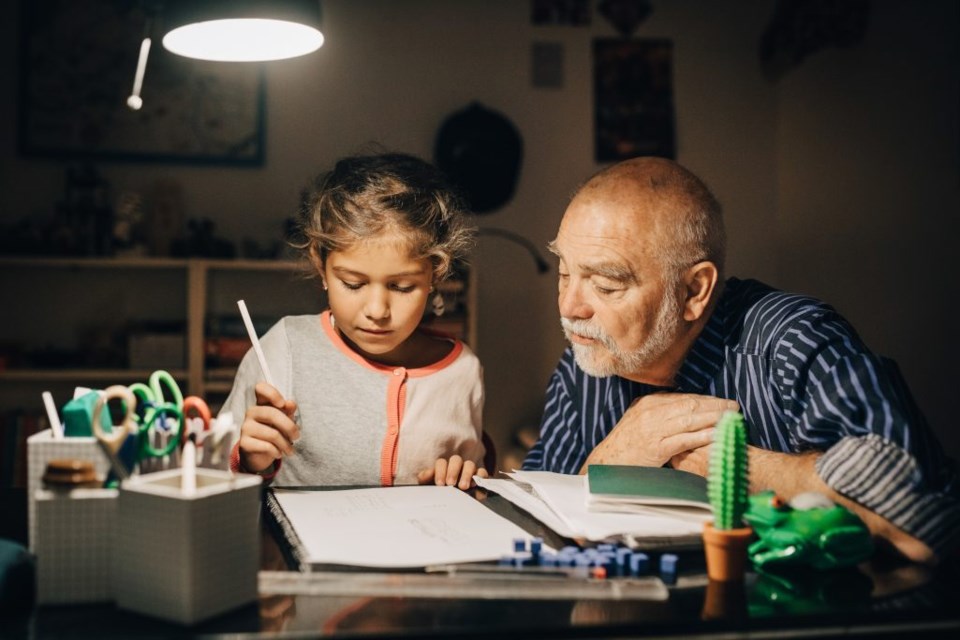Since the novel coronavirus outbreak shut down schools across Canada in mid-March, parents have been tasked with the stressful responsibility of homeschooling their children.
Teachers have moved the classroom online, doing everything they can to provide families with curriculum, guidance and other resources. But some parents still fear the time spent outside of the classroom could permanently harm their child’s development.
According to John Ippolito, a professor of education at York University in Toronto, parents shouldn’t be very worried — a short break from the classroom due to COVID-19 won’t cause any major disruptions to a child’s academic progression.
“In an ideal world, you want kids to have the opportunity to develop in a coherent and uninterrupted way, but the developmental continuum is a theoretical construct,” Ippolito said.
“Different kids develop along different continuum. They reach different milestones at different points.”
The break from traditional learning will not harm your child’s development, and they should be able to pick up where they left off when they return to the classroom.
Even if your child does “fall behind” in certain areas of the curriculum, Ippolito says that is perfectly normal and teachers will be understanding.
Feeling guilty
With many parents juggling home life, full-time jobs and all the stressors that come with a global pandemic, homeschooling may fall to the wayside — and that’s okay, Ippolito said.
“These are not normal circumstances,” he said.
“Some parents are just not in a position to (support their kids’ learning), and clearly, they shouldn’t be penalized for that, nor … should the kids.”
It’s better, said Ippolito, to think of e-learning as an “extra set of resources.”
“My living room is not a classroom,” he said. “As I see it, the point of this online learning at the moment is to remind kids that formal learning is still part of their lives.”
In fact, your child will likely return to school with a brand new set of life skills and perspective he or she learned during the pandemic — things they could’ve never learned inside the classroom.
A learning opportunity
In Ippolito’s view, although difficult for everyone, the pandemic can also be a valuable life lesson for children.
“Adults often have this view that we have to shelter kids from all of the uncertainties and risks of life, but they live in a world just like us,” Ippolito said.
The COVID-19 outbreak has the potential to be a “rich learning moment” for kids while they’re out of the classroom, broadening their perspective and opening their eyes to the world around them.
“These are moments when kids can really attune themselves to the realities around them, to the realities that their parents are dealing with,” Ippolito said.
“It’s our responsibility as adults to help them understand what’s happening and to respond in ways that will inform and support their future development as level-headed adults who are able to deal with life’s uncertainties — like global pandemics.”
When schools reopen
When students are allowed to return to the classroom, the top priority for everyone should be the “social and emotional issues of students, teachers and parents,” said Charles E. Pascal, a professor of applied psychology and human development at the Ontario Institute for Studies in Education.
“This has been an extremely stressful experience for them.”
When it comes to “making up for lost time,” Pascal said teachers should focus on the key things students need to know when they come to a new class.
“Teachers can ‘test’ for these necessary [entry-level] things to find out if they need to provide catch-up lessons for all or some students,” he said.
Ippolito is confident teachers will be extremely understanding and take things slow during the first few months back in the classroom.
“The intelligent and responsible thing to do here is to make the necessary accommodations [and] provide the extra support so that teachers can acknowledge the reality: that these kids missed three months of the previous year,” Ippolito said.
Ippolito, who teaches future teachers, believes Canadian educators are prepared to interpret and modify the curriculum on an as-needed basis in order to provide students with flexibility and compassion.
“That’s the job of teachers in the best of circumstances: they get paid and are trained to interpret a curriculum,” Ippolito said.
“I really don’t think that any educator … is interested in punishing students for the fact that we’ve had a major disruption.”
Flexible curriculum, in combination with a supportive team of educators, will help students successfully ease back into traditional learning — whenever that may be.
“Naturally, students vary regarding issues of resilience, challenges with learning and other differences that require careful individualized attention, [but] that has always been important and will be more important than ever,” Pascal said.
If this level of compassion and empathy are demonstrated, Pascal is confident that ” a new and better ‘normal’ [will] emerge.”
Questions about COVID-19? Here are some things you need to know:
Symptoms can include fever, cough and difficulty breathing — very similar to a cold or flu. Some people can develop a more severe illness. People most at risk of this include older adults and people with severe chronic medical conditions like heart, lung or kidney disease. If you develop symptoms, contact public health authorities.
To prevent the virus from spreading, experts recommend frequent handwashing and coughing into your sleeve. They also recommend minimizing contact with others, staying home as much as possible and maintaining a distance of two metres from other people if you go out.
For full COVID-19 coverage from Global News, click here.
Follow @meghancollie- Global News
